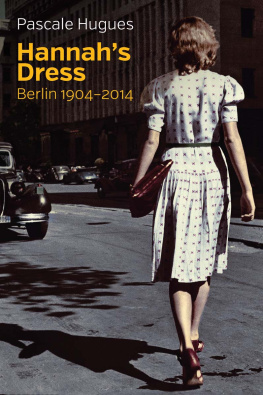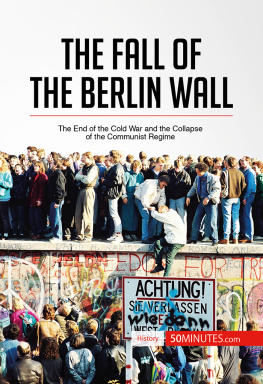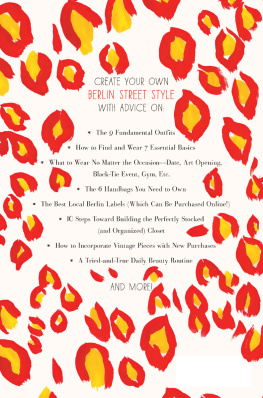Contents
Guide
Pages

For Kaspar and Taddeo the street of your childhood
Pascale Hugues
Hannahs Dress
Berlin 19042014
Translated by C. Jon Delogu
With passages from the German translated by Nick Somers
polity
First published in French as La robe de Hannah, ditions des Arnes, Paris, 2014
This English edition Polity Press, 2017
Polity Press
65 Bridge Street
Cambridge CB2 1UR, UK
Polity Press
350 Main Street
Malden, MA 02148, USA
All rights reserved. Except for the quotation of short passages for the purpose of criticism and review, no part of this publication may be reproduced, stored in a retrieval system, or transmitted, in any form or by any means, electronic, mechanical, photocopying, recording or otherwise, without the prior permission of the publisher.
ISBN-13: 978-1-5095-0985-0
A catalogue record for this book is available from the British Library.
Library of Congress Cataloging-in-Publication Data
Names: Hugues, Pascale, author.
Title: Hannahs dress : Berlin 1904-2014 / Pascale Hugues.
Other titles: Robe de Hannah. English
Description: English edition. | Malden, MA : Polity Press, [2017]
Identifiers: LCCN 2016038265 (print) | LCCN 2016038429 (ebook) | ISBN 9781509509812 (hardback) | ISBN 9781509509850 (Epub) | ISBN 9781509509843 (mobi)
Subjects: LCSH: Streets--Germany--Berlin--History--20th century. | Sch?oneberg (Berlin, Germany)--History--20th century. | Sch?oneberg (Berlin, Germany)--Social life and customs--20th century. | Sch?oneberg (Berlin, Germany)--Biography. | Berlin (Germany)--History--20th century. | Berlin (Germany)--Biography.
Classification: LCC DD887 .H8413 2017 (print) | LCC DD887 (ebook) | DDC 943/.1554--dc23
LC record available at https://lccn.loc.gov/2016038265
The publisher has used its best endeavours to ensure that the URLs for external websites referred to in this book are correct and active at the time of going to press. However, the publisher has no responsibility for the websites and can make no guarantee that a site will remain live or that the content is or will remain appropriate.
Every effort has been made to trace all copyright holders, but if any have been inadvertently overlooked the publisher will be pleased to include any necessary credits in any subsequent reprint or edition.
For further information on Polity, visit our website: politybooks.com
Acknowledgements
Thank you to all my neighbours past and present who took me into their confidence and shared with me the history of their lives. This return to the past was often painful. I admire your courage. And if any of you still doubt the interest of your little ordinary lives, I hope that this book justifies the initiative and actions of the person who listened to you, rapt in attention, for hours and hours.
Thanks to Barbara Wenner, my literary agent in Berlin, who accompanied me and shared in every discovery.
Thanks to Polity Press for taking interest in the story of a simple Berlin street, and to Anthony Giddens for his enthusiasm.
Thanks to C. Jon Delogu for his light and artful translation of the French text into English.
Thanks to Hermann Simon of the Centrum Judaicum who put me on the trail of the Jewish emigrants from my street and was with me in spirit during my travels; to the historian Gundrun Blankenburg, who knows better than anyone how to tell the story of the succession of constructions in my neighbourhood, building by building, between yesterday and today; to the archivist Axel Schrder, the guardian of the memory of my street, who held me firmly by the hand so as to keep me from getting lost in the dizzying labyrinth of the Landesarchiv-Berlin; and to Martin Luchterhandt, the archive director, who pointed me to the exit. Without him, I would still be ferreting about among all those enormous folders. Thanks also to Hannelore Emmerich and Veronika Liebau of the Tempelhof-Schneberg Archives for never giving up despite my barrage of nit-picky questions. And thanks to Elga Abramovitz, Harald Bodenschatz, Werner and Birgit Simon, and Christian Wlfken for their expert re-reading of the manuscript.
Thanks, finally, to Ingeborg and Georg Ullrich for allowing me to often take refuge in their house in Oderbruch and write far away from my street.
Quiet Street in Nice Neighbourhood
I dont know why I came to live here. Why this street rather than another? Choosing a street is rather arbitrary when you first arrive in a city you dont know. The procedure for avoiding unpleasant surprises is always the same: unfold a large-scale map, pore over it to get ones bearings amid the dense network of streets, intersections, bridges, squares and rail lines, then get out a pencil to circle and label key items park, underground, rail and bus stations, nice neighbourhood. Then list and rank the areas in descending order of preference from perfect to it will do, from if I must to no way.
What was the deciding factor that suddenly led me to make my choice? The central location. The proximity of a market and an underground stop. The outdoor cafs in the neighbouring streets. The evening calm. The peaceful shade of the chestnut trees that lined the pavements. Wasnt I also feeling under pressure to get settled somewhere as soon as possible with no time to spend weeks searching for the ideal location? Maybe it was just a chance harmonic convergence: a flat became available just as I was looking for one. A promising classified ad in the paper announced Ruhige innerstdtische Strasse mit Altbausubstanzin guter Wohnlage Quiet central street, renovated older building, nice neighbourhood. What more could one ask for? I dont think I hesitated long. It was my lucky day.
Visiting the flat, I was charmed right away by the ceiling mouldings garlands of leaves with chestnuts danced above my head. Then by the high sliding panel doors in the living room, the oval panes of old glass above other doors, the shiny wooden floor creaking under my feet, the big hundred-year-old cast-iron radiators hidden discreetly behind ornate covers, the delicate brass window handles, and the little terrace with its forged iron railing all bathed in sunlight. To go back down I took the old elevator, to which only residents of the building had a key a droll, twisted little key. The compartment of dark wood jerked abruptly between the second and first floors but finally returned me to the garnet-coloured marble entrance hall on the ground floor.
The estate agent who managed the building a sturdy woman with a cultured pearl necklace, over-spilling F-cup bosom, seventies-style French twist, and a fake-friendly smile met me again at the front door to tell me of the ex-cep-tion-al fringe benefits that came with the place: a meticulous concierge, a team of women who cleaned the common areas thoroughly every week from top to bottom (she pronounced the word thoroughly with such vigour that I had no difficulty imagining this Amazon leading a horde of intrepid women in the battle against dust and dirt), and neighbours with standing mit Niveau a term she let slide over her lips like a caramel. There were also private concerts, bridge parties in the afternoon with German champagne and petits fours, as well as chic cocktail parties. And thank goodness there was no pub at street level turning schnapps-soaked drunkards onto the pavement in the middle of the night. There were, however, good schools for children within a quarter-mile radius, she said, while looking me up and down and judging the curve of my tummy but withholding the question that she was clearly dying to ask. Finally, the knockdown argument: the department store KaDeWe was only five minutes away, she exulted, and here was the bus stop directly out front!











